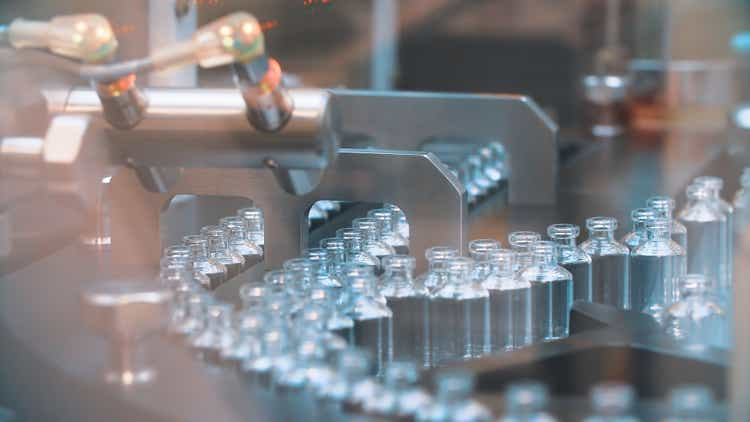aleksejplatonov
Deals and Financings
Beijing AIM Vaccine (HK: 06660) conducted a very small IPO on the Hong Kong exchange, raising just US$20 million, which netted the company only US$10 million. Previously, the company was hoping to raise up to US$125 million. Interest in the offering was low, with less than 1% of the company shares sold in the offering. The company claims to be the second-largest vaccine company in China based on its volume of released vaccines. It is the only Chinese company capable of developing all five types of global vaccine platforms, including mRNA.
Moderna (MRNA) says it is “eager” to sell its mRNA Vaccine in China, but balks at the conditions China imposes: either Moderna must sign up with a China-based partner, transferring all its technology to the China company and allowing the China company to make the drug, or the company must build a China manufacturing facility, again with a China partner, which would not involve a technology transfer (see story). Either way, Moderna assumes it would lose effective control of its IP, which it refuses to do, citing worries that its reputation would suffer if a partner produced unsafe/lower-quality vaccines.
Trials and Approvals
Connect Biopharma (CNTB) announced 30% of patients with atopic dermatitis (AD) had “clear” or “almost clear” skin after treatment with the company’s lead candidate, CBP-201. More than 80% of the patients reported a 50% reduction in the Eczema Area and Severity Index. CBP-201 was tested in a pivotal China trial that enrolled patients with moderate-to-severe AD. The candidate is an antibody that targets interleukin-4 receptor alpha to modify Th2 cell activity and treat inflammatory diseases. Connect, a Taicang-San Diego biotech developing T cell-driven therapies to treat inflammatory diseases, said it would use the data to file for China approval.
Shanghai SciClone Pharma (OTCPK:SCCPF, HK: 6600) has begun a China Phase III trial of RRx-001, a small-molecule immunotherapy targeting CD47-SIRPα that repolarizes tumor associated macrophages (see story). The candidate is designed to restore a tumor’s sensitivity to chemotherapy after previous rounds. In 2020, SciClone acquired China rights to the candidate from San Diego’s EpicentRx in a $120 million agreement. The trial is the China arm of a global Phase III REPLATINUM study being conducted by EpicentRx that will compare the efficacy of a combination of RRx-001 and a platinum doublet versus a platinum doublet alone.
San Diego’s TRACON Pharma (TCON) reported its PD-L1 candidate passed an interim test in a pivotal US-UK Phase II trial as a third-line therapy in soft tissue sarcomas. The Data Monitoring Committee recommended continuing the trial after a review of the 12-week safety data. In 2019, TRACON acquired US rights to develop envafolimab, an injected PD-L1 single-domain antibody, from Jiangsu Alphamab Oncology and 3D Medicines (Beijing). The trial is testing envafolimab in patients with undifferentiated pleomorphic sarcoma (UPS) and myxofibrosarcoma (MFS). In late 2021, Alphamab and 3D Medicines were approved to launch envafolimab in China.
Hangzhou Ascletis (OTCPK:ASCLF, HK: 1672) has dosed the first patient in a Phase II trial of its oral thyroid hormone receptor β (THRβ) agonist in patients with liver biopsy-proven non-alcoholic steatohepatitis (NASH) (see story). THRβ agonists have been effective in reducing low-density lipoprotein, triglyceride and hepatic steatosis in humans. By promoting fatty acid breakdown and stimulating mitochondrial biogenesis, THRβ helps to reduce lipotoxicity and improve liver function, thereby reducing liver fat. Ascletis said the ASC41 trial is currently the most advanced 52-week Phase II study started by a China biotech for liver biopsy-proven NASH patients.
Kira Pharma was cleared to start Phase II trials of its lead candidate, a first-in-class bifunctional biologic that targets the alternative and terminal complement pathways to treat lupus. The Phase II trial will evaluate the efficacy, safety and other key factors of KP104 in participants with systemic lupus erythematosus associated thrombotic microangiopathy in the US, China and Australia. In its Phase I trial, KP104 demonstrated proof-of-mechanism for both the terminal and alternative complement pathways. A Phase II trial in SLE-TMA also delivered encouraging data. Headquartered in Cambridge, MA, Kira also has facilities in China and Australia.
Suzhou Transcenta (HK: 06628) was approved to start US trials of its MASP2 targeting mAb that aims to prevent the inflammation and tissue damage mediated by lectin pathway complement activation. MASP2 (mannose-binding protein-associated serine protease 2) is a key enzyme in the lectin pathway initiation of complement activation. Activating the lectin pathway contributes to immunoglobulin A nephropathy, along with hematopoietic stem-cell transplantation–associated thrombotic microangiopathy. About 30-45% of patients with IgA nephropathy develop end-stage kidney disease, an unmet need. Transcenta discovered TST004 in-house.
Biosyngen said an IND for its autologous T cell therapy for relapsed/metastatic nasopharyngeal cancer was accepted for review in China. BRG01 works by genetically modifying a patient’s own T cells to express the additional receptor for Epstein-Barr virus antigen recognition and T cell activation when it engages EBV+ tumor cells. Biosyngen, with dual R&D centers and GMP facilities in Singapore and China, develops first-in-class and best-in-class innovative immunotherapies for global markets. The company says it has operations in Singapore, China, Germany, Australia, France and the US.
Disclosure: None.
Editor’s Note: The summary bullets for this article were chosen by Seeking Alpha editors.


Be the first to comment